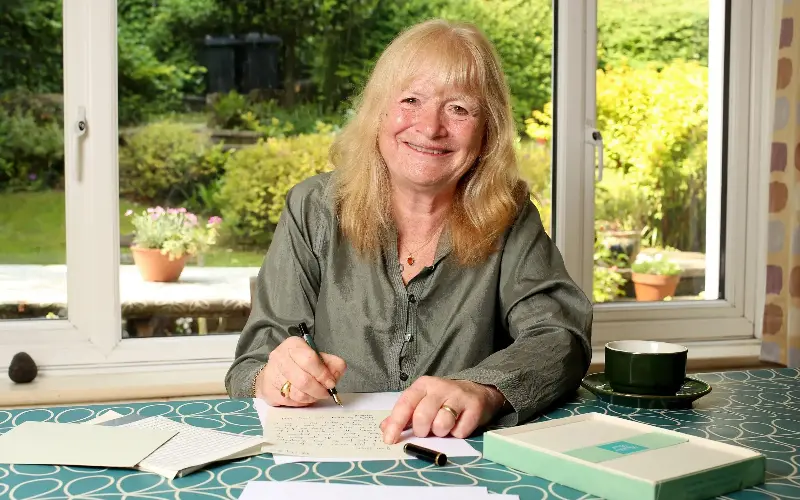
When I was growing up, the moment I finished opening my birthday or Christmas presents, my mother would press stationery into my hands and urge me to write my thank you notes. She even kept a detailed logbook. But in this digital age, is the proper handwritten thank you letter becoming a lost art?
That would be a real shame on two counts. It’s a lovely way to show your appreciation for someone’s hospitality or gfit-giving. But, more selfishly, it can benefit the thank-you-note sender. A new study published in the journal PLOS One suggests that writing a grateful missive can actually enhance our mental well-being.
“It definitely gives you a justified feeling of virtue,” says Liz Wyse, the editor of Debrett’s. “Also if you’re projecting positivity, and taking the time to savour a pleasant recollection of a good evening, that boosts your own mood. It’s a win-win.”
From tone and timing to enlisting a reluctant child or spouse, Wyse offers her expert advice on the etiquette of the thank you note.
Keep it short and sweet
A thank you letter needn’t be inordinately lengthy, advises Wyse. “The old-fashioned formula still applies: open with your thanks, being specific about why you appreciated the gift or hospitality, then move out into something more general, and come back for a reiterated thanks and sign-off. It shouldn’t just be a bald thank you, so include some news or chit-chat, but you can do all of that in two or three paragraphs.”
Avoid empty clichés
Wyse cautions against slipping into banal phrases such as: “Thank you for having me, I had a lovely time.” She explains: “It has the effect of sounding very dutiful and uninspired.” The tone of your letter should reflect your existing relationship, she adds. “You will probably communicate very differently with your grandmother than your best friend.”
So while you might begin both with a simple “Dear...”, she explains, you could then be more informal in your phrasing with a friend, such as referencing a shared long-running joke, to make it part of an ongoing conversation. Wyse recommends picking out a specific aspect you enjoyed and injecting a note of real enthusiasm, punctuated with an exclamation mark: “You made my favourite dessert even better by adding fresh berries from your garden – what a treat!” Crucially, your letter shouldn’t sound rote – or AI-generated.
Your sign-off should sum up the spirit of your letter. Don’t even think about deploying a boring “Best wishes” or “Yours sincerely”. Instead opt for the warm, affectionate “Much love”.
The sooner the better
If you’re thanking someone for their hospitality, Wyse says you shouldn’t wait any longer than two or three days to write; for a present, up to a week. “You don’t want the person who gave you something thinking, ‘Did they get it, did they like it?’ and feeling anxious.” If you are tardy with your note sending, Wyse recommends opening with a clear apology for the “belated” letter.
Conquer your dreadful handwriting
What should you do if, like me, your handwriting is horribly illegible? Wyse says the Debrett’s team are very pro-handwritten notes – but “we’re fighting a losing battle. People are so used to doing everything on their computers that their writing is deteriorating.”
Ultimately, she says, sending a thank you note, even in digital form, is better than not doing it at all. “But handwritten letters do have a particular value because they indicate that you’ve taken more trouble: buying stationery, finding the address, going to the postbox. People treasure them too. My mother has kept all of my son’s thank you letters.”
Help children – but not too much
My mother generally gave us free rein with thank you notes, which is why my eight-year-old brother described his gift of a Victorian kaleidoscope as “very useful” – to great amusement. Wyse says that if your child is writing to someone of the older generation, such as a grandparent, you might want to direct them a bit.
“But they will inevitably deviate, and you should allow them to do that. People are charmed by the authentic tone and eccentricities of a child’s writing. You don’t want to straitjacket them into a formula.”
Encourage your husband to contribute
I notice a gender split among my family and friends when it comes to thank you letters – as does Wyse. “Women have traditionally been the social correspondents, and, awful though it is to say it in the 21st century, some vestiges of that are hanging on.”
Is there a good way to get your reluctant partner to write a note? “If there is, I haven’t found it,” sighs Wyse. A good compromise, she suggests, is that you write the letter and get your male partner to add a little message or signature at the end, “so it looks like a combined effort.”
Keep it positive – even if it’s a disaster
This becomes a trickier exercise if you’re thanking someone for a dreadful party. But Wyse is firm that “thank you notes need to be relentlessly positive: that’s the unbreakable rule. It can actually be a fun, creative challenge. You’re allowed to inject some humour if it was a ridiculous, Grand Guignol disaster, but try to convey good spirits.”
The same goes for shoddy gifts. “We’ve all had terribly disappointing presents in our time, like a box of grey socks. But you have to dredge up some gratitude, even if you’re secretly thinking, ‘That was a bit cheap – they could afford something better,’ or, ‘How unimaginative.’”
Own up to bad behaviour, without making a fuss
What if you’re at fault: you spilt red wine on your host’s white sofa, or broke their favourite vase? Wyse says an apology is definitely in order. “But do it towards the end of your thank you letter. You don’t need to go on about it. Make a reference to your shortcomings and wrap your apology in a compliment, like, ‘I’m afraid I overindulged in your delicious single malt whisky.’”
It’s crucial, she observes, not to make this all about you. “Hospitality is a nerve-racking business. Your host is fretting about whether they carried it off. The classy thing to do is reassure them, not wallow in your own anxieties.”
A text message is fine – sometimes
Although Wyse is evangelical about the handwritten thank you note, she does admit that not every occasion calls for it. “It’s a judgment call. Think of it as a sliding scale based on the amount of effort that’s gone into the event. If you’re at a friend’s house midweek and they say, ‘Would you like to stay for pasta?’ sending an effusive, florid thank you letter is a bit much. A warm text or email would do the trick.”
